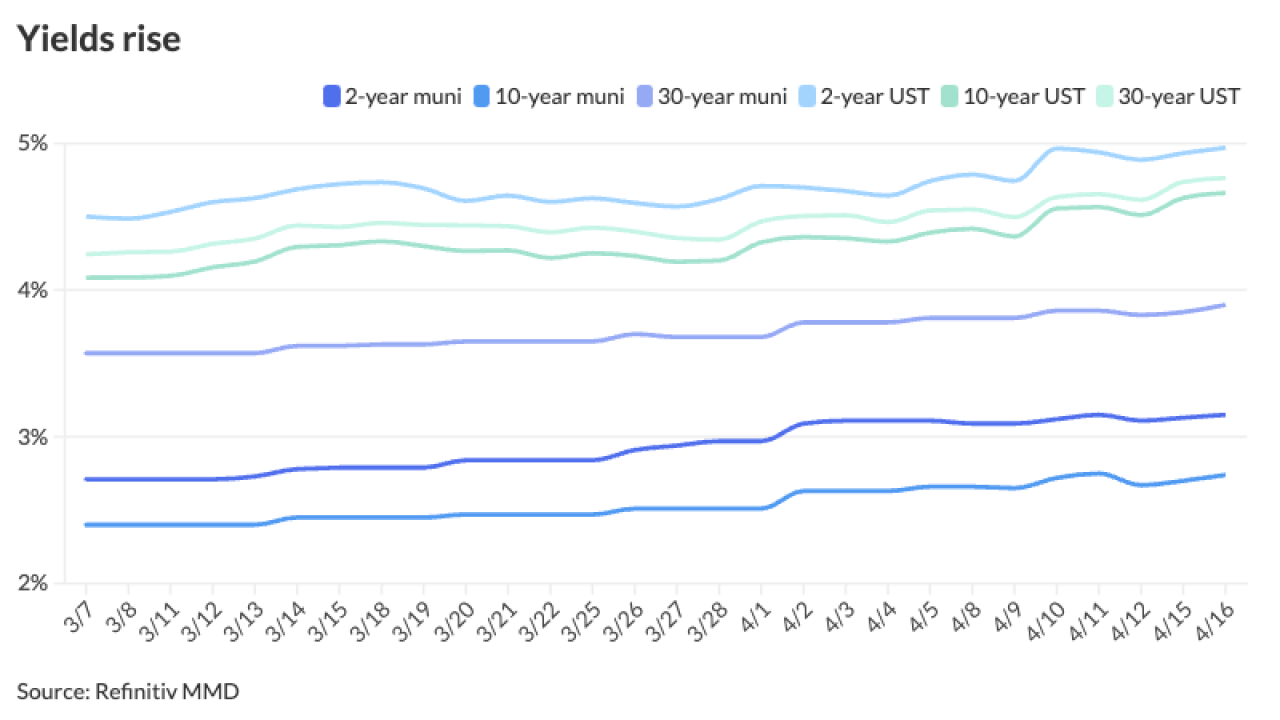Despite the weakness in the municipal market last week, as well as the preceding week's sell-off, there is value and opportunity on the horizon in the tax-exempt sector, says a recent report from BlackRock Inc.
"While 2011's price appreciation is unlikely to be replicated, 2012 holds the potential for attractive income relative to Treasuries with continued moderate volatility," Peter Hayes, managing director at BlackRock, wrote in his March 20 point of view: "Munis Make Their Mark: The Awakening of a Once 'Sleepy' Asset Class."
The expectations come on the heels of municipal bonds' "stellar" success story in late 2011, chiefly supported by the sector's relative cheapness, and falling rates that gave munis a boost in price and sent ratios to Treasuries soaring, according to Hayes.
"Munis emerged from an early slump to become one of the best-performing asset classes of the year — doing so with lower volatility than Treasuries," wrote Hayes, who is also a portfolio manager at BlackRock and head of its municipal bond investment team.
"The lower relative supply gave munis a scarcity value of sorts, particularly as those attractive ratios began to draw the attention of non-traditional buyers," he continued.
In 2012, the firm expects to see less supply than in the past 10 years — but still modestly more than in 2011 — and ratios between 30-year tax-exempt bonds and comparable Treasuries should remain above the 100% historical level typically seen in the past decade.
"The market is not pricing in the tax-advantage that an investor receives from buying municipal bonds," he said. In addition, "the recent flight-to-quality bid that has driven Treasury yields to historic lows has helped propel this relationship to uniquely high levels."
Both low supply and attractive ratios should set the stage for a strong bid for municipals going forward.
That is especially true as the second quarter gets underway on the heels of recent volatility, he told The Bond Buyer last Thursday.
"Sell-offs such as we have just experienced are usually healthy and ultimately offer investors an opportunity to find greater value," he said.
While demand will continue to be bolstered by a broader and more diverse buyer base seeking to uncover value and attractive yields, Hayes said, it may be more difficult for investors to find paper as a result.
"Traditional market participants are competing with crossover buyers who are finding a high-quality source of income in municipals that they're not getting in the taxable space," Hayes wrote.
Meanwhile, in the current low-rate environment — and in light of the Federal Reserve Board's commitment to keeping rates low through 2014 — Hayes recommends finding yield opportunities by taking on duration risk rather than credit risk.
"Credit spreads have been compressed recently and could very well widen as some of those headline risks apply pressure," he explained.
Meanwhile, in a separate report from BlackRock, two of Hayes colleagues' echo his views on value in the municipal market.
"While yields have the potential to follow Treasury rates higher and some headline risk lurks in the near-term, tax-exempt munis continue to be attractive relative to taxable fixed income," Boll Doll, chief equity strategist for fundamental equities, and Jeffrey Rosenberg, chief investment strategist for fixed income, wrote in their second quarterly investment commentary.
They differ slightly on structure, but also favor the long end.
"We continue to favor a barbell approach to yield-curve positioning, with exposure to both long and short maturities," the strategists wrote.
They recommend overweighting state tax-backed and essential service bonds, while they are cautioning against exposure to land-secured, senior living and student loan bonds, as well as local tax-backed offerings and issues backed by bond insurers.Besides attractive returns, Hayes expects bankruptcies and defaults to remain minimal and downgrades to be isolated to weaker local credits, according to the report.
While some cities and municipalities continue to face fiscal and economic hardships, those are viewed as more "idiosyncratic in nature and not a harbinger of a systemic threat or broader market trend," Hayes wrote.
While some multi-notch downgrades may also continue to surface, they are not necessarily a reflection of deteriorating credit fundamentals, he added.
"It has more to do with the fact that the rating agencies are using different metrics to review local issuers," he said.
Overall, Hayes said his firm is poised to take advantage of all the market has to offer in 2012.
"We're seeking to maximize income, minimize volatility and eliminate large portfolio shocks," he wrote.





